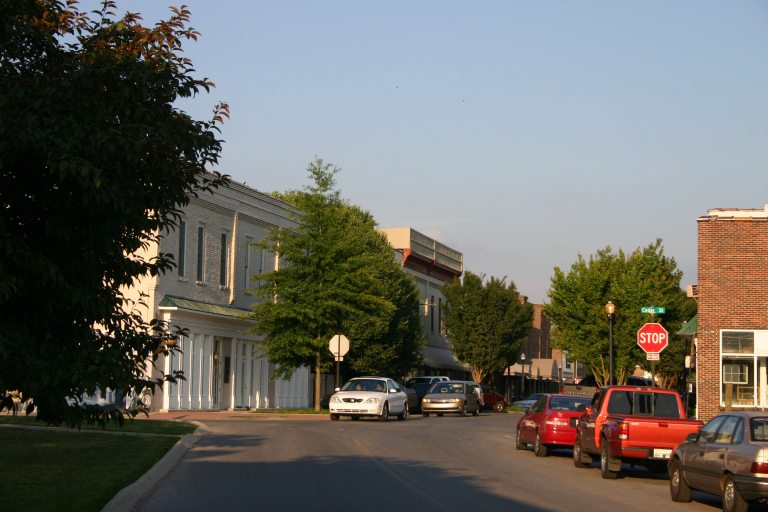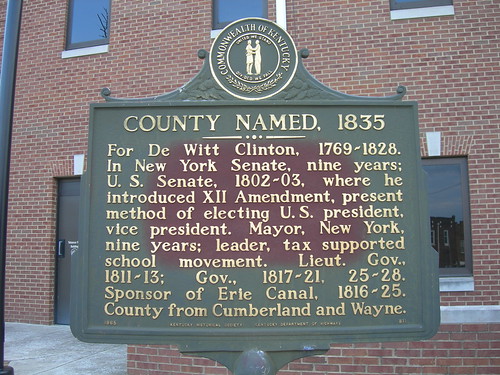Blue Highways: Wartburg, Tennessee
Unfolding the Map
Click on Thumbnail for MapMoving through Tennessee with William Least-Heat Moon, we get turned back by Wartburg. Like other towns, it rolls up its sidewalks during the evenings and on weekends. We also learn about the intriguingly named Frozen Head State Park, and are treated to allusions of Greek mythology counterposed with allusions to coporate America. Where else but Littourati can you get so much fun? Click on the thumbnail of the map to see where all this happens.
Book Quote
"Wartburg, on the edge of the dark Cumberlands, dripped in a cold mist blowing down off the knobs. Cafes closed, I had no choice but to go back into the wet mountain gloom. Under massive walls of black shale hanging above the road like threats, the highway turned ugly past Frozen Head State Park; at each trash dumpster pullout, soggy sofas or chairs lay encircled by dismal, acrid smoke from smoldering junk. Golden Styrofoam from Big Mac containers blew about as if Zeus had just raped Danae. Shoot the Hamburglar on sight."
Blue Highways: Part 1, Chapter 17
 Morgan County courthouse in Wartburg, Tennessee
Morgan County courthouse in Wartburg, Tennessee
Wartburg, Tennessee
Wow, Tennessee appears to be kicking LHM's ass. It's cold, it's largely closed for business, and it's full of trash that's not properly disposed of.
I suppose that life can feel like that sometimes. You are traveling along through your days, and you come upon places like Wartburg. The cafes are closed and you are wondering where you are going to get sustenance and nourishment. You just want someone to talk to, perhaps a nice waitress or a person in a warm tavern, who might listen and share something that will give you some strength for the journey ahead or, if not, to simply be there as company. But when you roll into town, all you see is emptiness, loneliness and people behind closed doors.
I'm sure that Wartburg isn't like that all the time. In fact, it is probably a very nice place. It got it's unusual name because it was founded by Germans and named after a famous castle in Germany. But in LHM's journey, Wartburg doesn't offer anything to him, and he has to retreat into the mountains and back to his loneliness. Remember, he undertakes this trip because of troubles with relationships and his job at home.
But the mountains may not offer solace either. They're cold and wet and you must traverse the forbidding places like Frozen Head State Park. The mountains around my hometown, the Coast Range, are often like that in winter. They are wet and gloomy, and there were times traveling through them that you just wanted to push through and get to the other side where it was a little warmer in the inland valleys. Dante painted Hell not as a fiery furnace, but as a cold and forbidding place.
I'm not sure I understand the trash allusion in relation to Zeus' rape of Danae. Does the styrofoam trash represent the Danae's clothing scattered around? And how does Danae relate to McDonald's? It would make more sense to me that McDonald's represents Zeus. Is the styrofoam the golden rain (Golden Arches) that Zeus used to impregnate Danae? Though I agree, we should shoot the Hamburglar on sight...I never liked that guy anyway.
The image that LHM presents reminds me of some areas of the developing world, where trash disposal is taken more lightly or is not possible due to strained government budgets. I remember traveling through areas of Mexico, El Salvador, Bangladesh and even Thailand where trash was often dumped, impromptu, at the side of the road. Those images in turn remind me of more impoverished areas of the U.S., such as Appalachia, where more trash than I usually see accumulated by roadsides. Even in cities, old ratty sofas are often left at the sidewalk by college students that have moved on. The sofas sit like faded courtesans, inviting you to partake of their comforts even though their tattered corners and ratty accoutrements give you pause.
Finally, at the end of this rambling post, I am reminded that even trash can become beautiful. In my hometown, there is a beach called Glass Beach. It is so called because for years, the town dumped its trash over the bluffs straight into the ocean. The dumping was discontinued in the 70s in favor of a county landfill, and in the decades since, the glass bits from hundreds of thousands of broken bottles wore into shiny, smooth, colorful and beautiful pebbles that are enjoyed by locals and visitors alike. From environmental disaster to beauty (sometimes), we journey as if from cold, wet and forbidding places back into the sunlight.
If you want to know more about Wartburg
Tennessee State Parks: Frozen Head State Park
Morgan County Chamber of Commerce
Morgan County News (newspaper)
Obed Wild and Scenic River Campground
Tennessee Vacation: Wartburg
WECO Radio: Wartburg
Wikipedia: Frozen Head State Park
Wikipedia: Wartburg
Next up: Oak Ridge, Tennessee




 Thursday, July 22, 2010 at 10:08PM
Thursday, July 22, 2010 at 10:08PM


